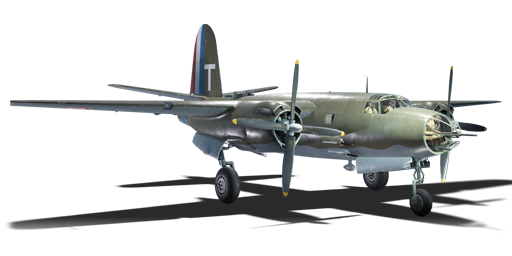



The B-26 Marauder was a medium bomber, designed to be used both for high altitude bombing but to also provide close air support to Allied troops if necessary. France acquired a number of B-26C Marauders after Operation Torch in 1942, replacing the LeO 451s and Douglas DB-7s. They were used in the Allied invasions of Italy and southern France. After the war, most of them were retired, but some stayed for training and testing; one was even converted to test the early SNECMA ATAR jet engines.
It was introduced in Update "Wind of Change". This version of the B-26 Marauder under French service, designated as the B-26C, is virtually the same as the B-26B found in the American tech tree, save for the livery. The different designations were intended to distinguish the batch of extended wing B-26 variants that were produced in Omaha, Nebraska instead of Baltimore, Maryland. Compared to the previous French bombers, the Marauder serves as a "middle ground" between a massive, high-flying bomber like the N.C.223.3 and various fast but lightly armed bombers like LeO 451. The plane is quite sluggish for a medium bomber, but featuring protection and payload closer to that of a heavy bomber. This allows the Marauder to either be used for bombing bases, attacking columns of vehicles, or providing close air support in ground and naval battles with great efficiency.
flaps
flaps
flaps
brake
| Belt | Belt filling | Armor penetration (mm) at a distance: | |||||
|---|---|---|---|---|---|---|---|
| 10 m | 100 m | 500 m | 1000 m | 1500 m | 2000 m | ||
| T/Ball/Ball/I/AP-I | 28 | 26 | 18 | 11 | 7 | 4 | |
| AP-I/AP-I/AP-I/T/I | 28 | 26 | 18 | 11 | 7 | 4 | |
| T/AP/AP/AP/AP-I/I | 30 | 27 | 20 | 13 | 9 | 6 | |
| T/T/T/T/T/AP-I | 28 | 26 | 18 | 11 | 7 | 4 | |
| AP/AP-I/AP-I/I/I | 30 | 27 | 20 | 13 | 9 | 6 | |
| Belt | Belt filling | Armor penetration (mm) at a distance: | |||||
|---|---|---|---|---|---|---|---|
| 10 m | 100 m | 500 m | 1000 m | 1500 m | 2000 m | ||
| T/AP/I/AP-I | 30 | 27 | 20 | 13 | 9 | 6 | |
| AP/AP/AP/T | 30 | 27 | 20 | 13 | 9 | 6 | |
| AP-I/AP-I/AP-I/T | 28 | 26 | 18 | 11 | 7 | 4 | |
| Belt | Belt filling | Armor penetration (mm) at a distance: | |||||
|---|---|---|---|---|---|---|---|
| 10 m | 100 m | 500 m | 1000 m | 1500 m | 2000 m | ||
| T/AP/I/AP-I | 30 | 27 | 20 | 13 | 9 | 6 | |
| AP/AP/AP/T | 30 | 27 | 20 | 13 | 9 | 6 | |
| AP-I/AP-I/AP-I/T | 28 | 26 | 18 | 11 | 7 | 4 | |












Flight performance | |
|---|---|
Survivability |
|---|
Weaponry | ||
|---|---|---|